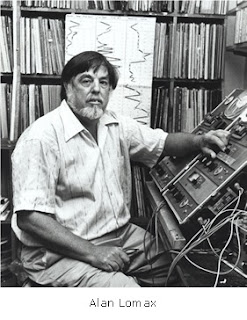Alan Lomax (January 31,1915-July 19, 2002) was an American ethnomusicologist, best known for his numerous field recordings of folk music of the 20th century.
He was also a musician himself, as well as a folklorist, archivist, writer, scholar, political activist, oral historian, and film-maker.
Lomax produced recordings, concerts, and radio shows in the US and in England, which played an important role in preserving folk music traditions in both countries, and helped start both the American and British folk revivals of the 1940s, 1950s, and early 1960s.
He collected material first with his father, folklorist and collector John Lomax, and later alone and with others, Lomax recorded thousands of songs and interviews for the Archive of American Folk Song, of which he was the director, at the Library of Congress on aluminum and acetate discs.
After 1942, when Congress cut off the Library of Congress's funding for folk song collecting, Lomax continued to collect independently in Britain, Ireland, the Caribbean, Italy, and Spain, as well as the United States, using the latest recording technology, assembling an enormous collection of American and international culture.
In March 2004, the material captured and produced without Library of Congress funding was acquired by the Library, which brings the entire seventy years of Alan Lomax's work together under one roof at the Library of Congress, where it has found a permanent home.
More information: Cultural Equity
With the start of the Cold War, Lomax continued to speak out for a public role for folklore, even as academic folklorists turned inward. He devoted much of the latter part of his life to advocating what he called Cultural Equity, which he sought to put on a solid theoretical foundation through to his Cantometrics research (which included a prototype Cantometrics-based educational program, the Global Jukebox).
In the 1970s and 1980s, Lomax advised the Smithsonian Institution's Folklife Festival and produced a series of films about folk music, American Patchwork, which aired on PBS in 1991. In his late seventies, Lomax completed a long-deferred memoir, The Land Where the Blues Began (1995), linking the birth of the blues to debt peonage, segregation, and forced labor in the American South.
Lomax's greatest legacy is in preserving and publishing recordings of musicians in many folk and blues traditions around the US and Europe.
Among the artists Lomax is credited with discovering and bringing to a wider audience include blues guitarist Robert Johnson, protest singer Woody Guthrie, folk artist Pete Seeger, country musician Burl Ives, Scottish Gaelic singer Flora MacNeil, and country blues singer Lead Belly, among many others.
Lomax, now 17, therefore took a break from studying to join his father's folk song collecting field trips for the Library of Congress, co-authoring American Ballads and Folk Songs (1934) and Negro Folk Songs as Sung by Lead Belly (1936).
From 1937 to 1942, Lomax was Assistant in Charge of the Archive of Folk Song of the Library of Congress to which he and his father and numerous collaborators contributed more than ten thousand field recordings.
From 1942 to 1979 Lomax was repeatedly investigated and interviewed by the Federal Bureau of Investigation (FBI), although nothing incriminating was ever discovered and the investigation was eventually abandoned.
In December 1949 a newspaper printed a story, Red Convictions Scare 'Travelers', that mentioned a dinner given by the Civil Rights Association to honor five lawyers who had defended people accused of being Communists.
Lomax spent the 1950s based in London, from where he edited the 18-volume Columbia World Library of Folk and Primitive Music, an anthology issued on newly invented LP records.
More information: The Library of Congress
Upon his return to New York in 1959, Lomax produced a concert, Folksong '59, in Carnegie Hall, featuring Arkansas singer Jimmy Driftwood; the Selah Jubilee Singers and Drexel Singers (gospel groups); Muddy Waters and Memphis Slim (blues); Earl Taylor and the Stoney Mountain Boys (bluegrass); Pete Seeger, Mike Seeger (urban folk revival); and The Cadillacs (a rock and roll group).
Lomax was a consultant to Carl Sagan for the Voyager Golden Record sent into space on the 1977 Voyager Spacecraft to represent the music of the earth.
Music he helped choose included the blues, jazz, and rock 'n' roll of Blind Willie Johnson, Louis Armstrong, and Chuck Berry; Andean panpipes and Navajo chants; Azerbaijani mugham performed by two balaban players, a Sicilian sulfur miner's lament; polyphonic vocal music from the Mbuti Pygmies of Zaire, and the Georgians of the Caucasus; and a shepherdess song from Bulgaria by Valya Balkanska; in addition to Bach, Mozart, and Beethoven, and more.
Alan Lomax died in Safety Harbor, Florida on July 19, 2002, at the age of 87.
More information: Open Culture
when I met them was to sit down and record everything they knew,
give them a first real run-through of their art.
Alan Lomax


No comments:
Post a Comment